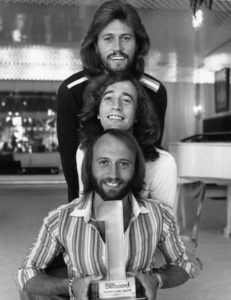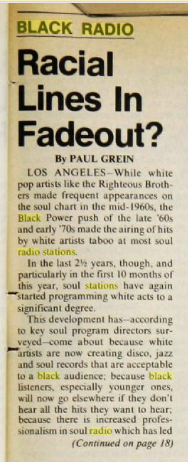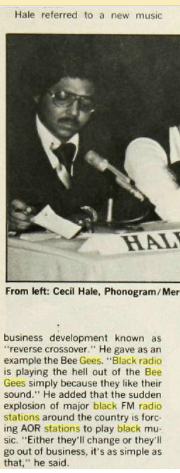In honor of Black History Month here in the United States, I would like to present this article I wrote about Robin in 2012. I was still getting to know who he was as a person and musician at that time. I learned quickly that he and his brothers felt a strong connection to black R&B soul music. I write this post to honor and recognize this connection and the courage he had to give birth to the R&B music that truly was in his heart.
Robin Gibb: An Interracial Musical Legacy
By Christina Samuels
September 19, 2012 (updated February 22, 2019)
This article is dedicated to Robin Gibb, to honor his memory and legacy.
Robin Hugh Gibb, CBE of the Bee Gees died on May 20, 2012 at the age of 62.
The outpouring of kind sentiments since his death shows that Robin is a much-loved man for a variety of reasons. Whether it is love of the Bee Gees music, Robin’s music as a solo artist, his sense of humor, or tremendous humanitarian spirit, many can find a reason to send blessings his way.
No-Go Areas in Music
When you first think of Robin Gibb, you may not think of him as having an interracial musical legacy. However, if you listen closely to some of the things he has said over the years, it is clear to me that he did.
Recently, I had the pleasure of watching a 2010 documentary on the Bee Gees called In Our Own Time.
During a segment of this documentary, Robin commented on the period of time during the 1970’s when the Bee Gees recorded one of their famous hits, Jive Talkin’.
He mentioned the pressures that white bands, especially white American bands, had at the time to not go into so-called black areas of music. However, as a British band, Robin commented that they did not feel the same pressures or fears. According to Robin, “Because we were English, we were less self-conscious about exploring the no-go areas…” He then goes on to say, “We didn’t think that there was any “no go” areas, it’s music!”
I could not agree more. Within these words lies the heart of Robin Gibb’s interracial musical legacy. He loved black R&B music as did his brothers. But more importantly, they had the courage and talent to not only pursue this love, but to bring their unique creations into the world, whether other people liked it or not.
I felt so many emotions when I heard Robin’s words. First, I was so grateful that he, his brothers and producers had the courage to see music this way. Imagine how many Bee Gees songs would have never been released if they had thought otherwise.
It has always been a shame to me that racial segregation has crept into and corrupted something as universal as music.
There is nothing wrong with celebrating and acknowledging the racial and ethnic origins of different types of music. The Bee Gees were good at acknowledging the black American roots of their music and openly confessed their admiration of artists such as Stevie Wonder and Otis Redding. (1)
In a Detroit Metro Times article by Michael Jackman, Robin is quoted as saying:
“The Bee Gees were always heavily influenced by black music … and soul has always been my favorite genre.”
But, why should singers be banned from performing a certain type of music if they are not from a particular race or ethnic group? To do this is to cut off the creative energy that groups like the Bee Gees wanted to express. If they have the talent, why not support them in pursuing the music that excites them?
There are no “no go” areas when it comes to performing music or listening to music as a fan.
The Racial Politics of Music
As a black American woman, there have been many times in my life when black friends and acquaintances would raise an eyebrow at my diverse taste in music. This was especially during the late 1980’s. If I dared to express my fondness for bands such as U2 or REM, I would be met with disapproval clearly indicating I was some kind of social misfit.
To them, this type of music was a “no go” area.
I guess I’m not supposed to like them according to some people because I’m black and I owe some kind of strange loyalty to only black musicians. That doesn’t make any sense to me. I like lots of styles of black music, especially 70’s disco, but I also like lots of other types of music as well. It’s too bad I didn’t have Robin’s quote handy at the time.
I was confronted with a similar attitude just a few years ago. My husband and I were shopping in a store and waiting for assistance. On that day, I was wearing a Bee Gees t-shirt. While we were waiting, a black gentleman came in the store. He was waiting for customer service as well. He looked over at me and saw my t-shirt. He said, “Bee Gees? That’s a first.” I said to him that they are my favorite band and I love them.
After we left the store, my husband spoke to me about this comment. He said that the guy said that to me because I’m probably the first black female that he’s ever seen wearing a Bee Gees t-shirt! That may very well be the case, but I’ve got news for him: black women like the Bee Gees too! We do now and we did in the 70’s. I guess he never saw this Soul Train video showing plenty of black women dancing to the Bee Gees’ music! I wish the video was longer!
The funny thing is that day, Spirit had my back. As we were pulling out of the store, getting ready to make a left turn, I saw a truck with a license plate that read, “T-SHIRT”! Can you believe that? Right on cue too, after all this talk about my Bee Gees t-shirt. I felt like I was being watched over. That was pretty cool!
I love my Bee Gees t-shirts and I will continue to wear them. This t-shirt is one of my favorites because I love the colorful font.
I get nice comments from both white men and women about my t-shirts. It seems people love being reminded of the Bee Gees. The shirts are great conversation starters in grocery stores!
During the summer of 2017, I called for an Uber driver while I was in Atlanta, Georgia. I was picked up by an older black gentleman who was listening to a Christian radio station. He asked me if the music was ok and I said, “Yes, I need all the help I can get.” I was in the process of moving at the time.
While I was in his car, my phone rang. When it rings, Stayin’ Alive plays.
After I got off the phone, he was quiet for a few moments. Then he made a comment about how Stayin’ Alive was playing when my phone rang and how much he liked hearing it again. He said he thought that was really good music back then. We had fun talking about 70’s music during the rest of the trip. Hearing Stayin’ Alive for just a few moments made both of our days more enjoyable and I encouraged him to listen to more Bee Gees music. For many of us, it brings back good memories.
When it comes down to it, music is universal art that can take many forms and evoke a wide range of emotions. Music is created by humans of diverse racial and ethnic backgrounds but ultimately transcends these human limitations. As of 2019, I would say that most people have musical tastes that include artists not of their own racial or ethnic background.
No one should be made to feel bad because they like the music of people who come from a different ethnic group than their own. That is the absurdity of racism. It is ultimately a complete waste of energy. I prefer to enjoy the delicious buffet that is the music industry.

Photo by: NBC Television – eBay itemphoto frontphoto back, Public Domain, https://commons.wikimedia.org/w/index.php?curid=17161246
Twin Souls-Racial Identity
For this segment, the sociologist within me is going to come out.
The Bee Gees were so good at singing black R&B soul music, there was a time that fans thought they were black. In an interview from 1989 by Ina.fr on YouTube, they talked about their R&B roots and their crossover as a white band into black music.
The interviewer commented on how fans thought they were black, at which time Robin joked and said, “Well, we were black, but we had an operation 3 years ago and mine didn’t quite work…” Meaning, he was still black. He made some other funny comments that made me laugh.
I cannot find the interview on Youtube at this time, but maybe you’ve seen it if you’re a fan of the Bee Gees. Here is a clip from the interview, which was much longer originally. You may recognize it.
Unfortunately, it does not have the dialogue I’m referring to. I have the quotes from the interview because I have it saved in my files.
The interviewer also asked Barry about the similarities between his and Robin’s voice since they are brothers.
Barry said, “They’re not really that similar.” He went on to say that the tones are similar but, “Robin’s voice is a little blacker than mine, a little more R&B, as he said, he is black…”
Then Robin said, “I’ve always been black…” Barry interjected with a slight disagreement, remarking about some other time but Maurice said they didn’t want to talk about that.
When I was just learning about him years ago, it really stood out to me that he felt so closely identified with black music that he would say this. I was also so happy from a twin soul perspective, because I’m black.
When twin souls come from different parts of the world, they probably won’t look alike. But I hypothesize that twin souls may identify with each other’s racial or ethnic background in some way so they end up feeling like they are a part of the racial group that their twin is a part of.
Robin said he’d always been black, in terms of music and perhaps in other ways I’m not aware of. I grew up in a predominately white, Irish-Catholic suburb of Boston, MA which contributed to my feeling biracial most of my life internally even though externally to the world, I am black. Sometimes, racial identity is a little more complex than neatly fitting in a box of “black” or “white.”
I wonder sometimes if I was born where I was so I would be more closely connected to Robin’s racial background. It’s interesting that he was raised in England and I was born and raised in New England. I also wonder if this was orchestrated so that we would see the connection later, after his death.
At any rate, being born and raised in the suburbs of Boston had everything to do with my musical tastes because I was usually exposed to the songs of white musicians on a regular basis. That is what I was surrounded by. I am grateful that I never had a segregationist view of music.
Twin Soul Music Issues
At one point or another, Robin and I both had trouble gaining acceptance, in terms of music, in a way that is similar to each other.
There was a time when black radio stations didn’t want to play Bee Gees music because they were white singers.
Robin was an English singer who listened to and loved black R&B soul music. He sang in the style of R&B contemporary music but was rejected by black stations because he was a member of a white band.
I’m sure that rejection was difficult for him and his brothers because of their love for black soul music.
When I learned about the rejection he faced, it reminded me of my own issues with rejection over my musical tastes.
As I mentioned above, there was a time in my life when some of my black friends didn’t like it that I loved alternative rock music created by white musicians.
They treated me like I was doing something that I wasn’t supposed to do. That was difficult for me as well, to be rejected because of the music I liked.
The roots of these attitudes lie in the troubled racial history of the United States. It is reflected in this article from Billboard, October 30, 1976 by Paul Grein called Black Radio – Racial Lines in Fadeout?
Here is a screen shot from page 3 illustrating this point. The link above will take you to a section of the Billboard article where the Bee Gees are mentioned, as well as the politics behind why certain music is played on particular radio stations. It’s really interesting to read Billboard articles from the 1970’s.

Screenshot of Billboard October 30 1976
Even though we had vastly different connections with music (Robin being a career musician versus my being a music fan), we both dealt with race-related music issues. Robin faced this discrimination and rejection on a much larger, more public scale than me, but I can truly relate to how he must have felt. We both faced rejection because we crossed over into areas of music different than our own racial group, thereby challenging rigid cultural norms and stereotypes.
Ultimately, we both decided to be true to ourselves and followed the music we loved despite the shaming disapproval of others. We both had self-acceptance which is the most important acceptance to have.
Acceptance
The self-acceptance and perseverance eventually evolved into acceptance from black radio stations because the Bee Gees were great song-writers and singers and they had the right sound. This is an important aspect of black history as it relates to music in the U.S.
In an article called, Why the Bee Gees Sound So Good by Janet Maslin (February 18, 1979, Page 19; The New York Times Archives) the Bee Gees were described as having the same strengths as Motown groups. They were able to create dance and party music that both black and white audiences enjoyed. (2)
This statement is mirrored by Robin’s comments made during the time that Too Much Heaven was released and gaining more attention:
Much to the group’s delight, it also rapidly gained recognition on the American soul radio stations. “At the moment, it’s really taken off big on the black stations,” Robin said. “We’ve got a lot of black people buying our records, but we’ve never had [acceptance from] black stations.” (3)
It seems like it took a beautiful song with themes of love and heaven to help break down that wall and gain the acceptance. Too Much Heaven is a song that all of humanity can benefit from and relate to at some point in our lives.
To substantiate what Robin said, here is a screenshot from Billboard, September 30, 1978, page 43, where there is a discussion of black radio stations playing Bee Gees music to a much greater extent: See the image below.

Screenshot, Billboard Sept. 30 1978
I celebrate the fact that the Bee Gees were able to overcome the reluctance of black radio stations to play their music during the late 1970’s. (See the17th paragraph down on the albumlinernotes link). Music has the potential to bring people together in unity.
Black stations agreed to play Bee Gees’ music it because it was great music at its core that they liked. And as Robin said, black listeners and audiences liked the Bee Gees music and wanted to hear it played on the radio, so black stations had to change to keep up with the demands of the times.
In Closing
I close with this quote below. As I read this, I took a moment to consider how much work and sacrifice it took the Bee Gees to create soulful, impactful music across the decades that connected with people from all backgrounds. The Bee Gees are not popular with just black and white audiences. Their fans come from all around the world, including Japan and Mexico:
By 1976, “The Bee Gees’ music had successfully spanned several generations, and they were also popular with both black and white audiences, an accomplishment that is rare in rock history. Virtually no group has enjoyed such mass popularity with such a diverse audience…” (4)
For this reason, I will always admire and enjoy the interracial and multi-cultural legacy of Robin Gibb and the Bee Gees.
I learned a lot about the music industry in the 1970’s as a result of writing this post and really enjoyed it. It was an interesting way to acknowledge Black History Month. I honor black R&B soul musicians who positively influenced the careers of many successful artists, including the Bee Gees.
Thank you, Robin, for sharing your gifts with the world. You will always be loved and remembered. Love and thanks to Maurice as well.
References
- Bee Gees: The Authorized Biography by Barry, Robin and Maurice Gibb as told to David Leaf, March, 1979, page 101
- https://www.nytimes.com/1979/02/18/archives/why-the-bee-gees-sound-so-good-the-bee-gees.html
- Bilyeu, Melinda; Cook,Hector; Môn Hughes,Andrew. The Ultimate Biography Of The Bee Gees: Tales Of The Brothers Gibb (Kindle Locations 12185-12187). Omnibus Press. Kindle Edition.
- Bee Gees: The Authorized Biography by Barry, Robin and Maurice Gibb as told to David Leaf, March, 1979, page106

 sed me to feel strongly connected to Robin. I feel his presence was with me throughout my meanderings that day. It eased the tension of facing my colonoscopy appointment. That is one of the main benefits of afterlife communication: it comforts us and reminds us that spiritually, we are not alone. Unseen loved ones are with us. They make their presence known and “visible” through these communications.
sed me to feel strongly connected to Robin. I feel his presence was with me throughout my meanderings that day. It eased the tension of facing my colonoscopy appointment. That is one of the main benefits of afterlife communication: it comforts us and reminds us that spiritually, we are not alone. Unseen loved ones are with us. They make their presence known and “visible” through these communications.














